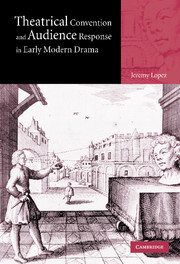Book contents
- Frontmatter
- Contents
- Acknowledgments
- Introduction
- PART I
- 1 “As it was acted to great applause”: Elizabethan and Jacobean audiences and the physicality of response
- 2 Meat, magic, and metamorphosis: on puns and wordplay
- 3 Managing the aside
- 4 Exposition, redundancy, action
- 5 Disorder and convention
- PART II
- Plays and editions cited
- Works cited
- Index
3 - Managing the aside
Published online by Cambridge University Press: 22 September 2009
- Frontmatter
- Contents
- Acknowledgments
- Introduction
- PART I
- 1 “As it was acted to great applause”: Elizabethan and Jacobean audiences and the physicality of response
- 2 Meat, magic, and metamorphosis: on puns and wordplay
- 3 Managing the aside
- 4 Exposition, redundancy, action
- 5 Disorder and convention
- PART II
- Plays and editions cited
- Works cited
- Index
Summary
Puns fill the space between stage and audience by transforming all-too literal words and syllables into a matrix of virtually endless figurative and interpretive possibilities; asides, on the other hand, demarcate theatrical space, isolating but insisting on the simultaneity of several different and very specific interpretive possibilities for the on-stage action. The aside is one of the most pervasive conventions of English Renaissance drama, and one of the most potentially disruptive. It calls attention to the power of the stage to represent a multiplicity of actions, dialogues, points of view – that is, it helps create a convincing theatrical space; but as a consequence it opens up a variety of problems with respect to the negotiation of physical space on the stage itself. Even as playwrights ask their audiences to focus on the intricacies of poetic dialogue, they also break up that focus by giving characters moments of (frequently intricate) direct address that comment on, misinterpret, break into, or sound over that dialogue. Like expository speeches (the subject of the next chapter), asides can stand in for action – can clarify motivation and background information even as the main action and dialogue are moving forward. But, as we will see too with expository speeches, the potential surfeit of information asides provide – requiring the audience to focus its attention on several points at once – can be more distracting than illuminating.
- Type
- Chapter
- Information
- Publisher: Cambridge University PressPrint publication year: 2002



